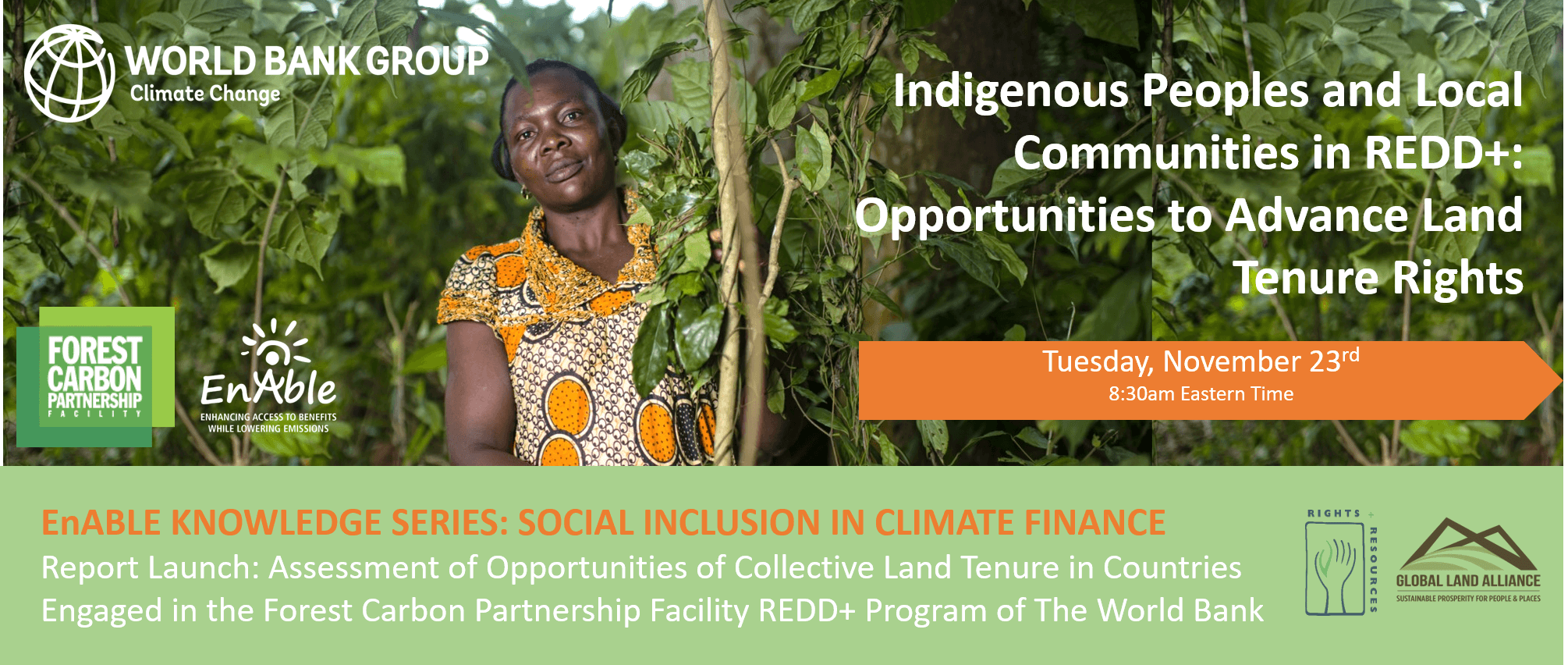-This Event has ended -
Tuesday, November 23rd, 2021
8:30 AM – 10:00 AM (Eastern Time)
Online via Zoom
This session will be interpreted in French and Spanish.
Description:
|
Strengthening Indigenous Land Tenure: A Critical Pillar of Climate Action |
A prominent outcome of this year’s UN Climate Summit in Scotland (COP26) was the Glasgow Leaders' Declaration on Forests and Land Use, signed by more than 130 world leaders whose countries contain more than 90% of world forest. In support of this Declaration the UK, Norway, Germany, the US, and the Netherlands, in partnership with 17 funders, pledged at the COP26 to invest US$1.7 billion to help Indigenous and Local Communities protect the biodiverse tropical forests that are vital to protecting the planet from climate change, biodiversity loss, and pandemic risk. Land tenure security for Indigenous Peoples and Local Communities will be a key pillar of this support.
A new World Bank report, “Opportunity Assessment to Strengthen Collective Tenure Rights in Forest Carbon Partnership Facility Countries(1)”, identifies specific pathways for strengthening collective land tenure rights of IPLCs and features 18 detailed country profiles. Securing formal recognition and security of customarily held land rights is an important step towards improving the efficacy and inclusivity of emissions reductions projects and achieving global climate and biodiversity goals.
Brought to you by the World Bank Climate Funds Management Unit this webinar will present the key findings of the study, including examples of core and country-level analysis, cross-sectoral issues, and lessons learned. Experts, Indigenous Leaders, and government representatives will discuss the significance and potential applications of these findings for REDD+ countries, IPLCs, land and forest rights practitioners, and social development practitioners.
You can download the full report here and find additional resources (including a report summary) on our event webpage.
This webinar is the first in an EnABLE series on Social Inclusion in Climate Finance.
[1] The 18 FCPF countries listed in the study are: Chile, Costa Rica, Côte d’Ivoire, the Democratic Republic of Congo, the Republic of Congo, the Dominican Republic, Fiji, Ghana, Indonesia, Lao People’s Democratic Republic, Madagascar, Mexico, Mozambique, Nepal, Nicaragua, Peru, Guatemala, and Vietnam.
Agenda
|
Moderator |
Pablo Mis, Maya Leaders Alliance, Chair of the United Nations Voluntary Fund for Indigenous Peoples (UNVFIP) |
|
Opening Remarks |
Marc Sadler, Manager, Climate Funds Management Unit, World Bank Climate Change Group |
|
Presenters |
Malcolm Childress, Executive Director, Global Land Alliance Jim Smyle, Independent Consultant, Natural Resources Specialist |
|
Discussants |
Pasang Dolma Sherpa, Executive Director, Center for Indigenous Peoples’ Research and Development (CIPRED) Anne Larson, Principal Scientist, Center for International Forestry Research (CIFOR) Asyl Undeland, EnABLE Fund Manager, Climate Funds Management Unit, World Bank Climate Change Group |
|
|

